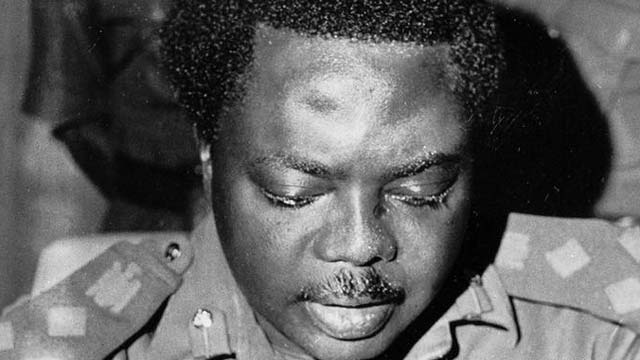It is now 45 years ago when Nigeria’s much-beloved Head of State, General Murtala Mohammed was assassinated. Readers of some age group would have their own recollections of that day when gloom pervaded the entire length and breadth of the country.
On 13th February 1976, when the General was ambushed on the way to the office in Lagos and killed, I was halfway into my final year in the School of Business, Kongo campus, ABU, Zaria. We were accustomed to coups having lived through three in the preceding 10 years. The two coups in 1966 were as violent as they came. In the first one, the country lost the prime minister, two premiers and top notches of the Nigerian Army as well as a very senior federal minister. In the second putsch, the Head of the Military Government along with a military governor were killed. In contrast, the 1975 coup that installed General Murtala as Head of State was a peaceful one and could be likened to a palace coup.
- How Angry Youths Barred Oyo, Ondo Governors From Monarch’s Palace in Ibadan
- Crisis persists in Ibadan despite closure of Shasha market
But this one caught everyone off guard, taking place in broad daylight as the stalkers took advantage of a Head of State whom in his humble reasoning refused heavily armed security and/or clearance of paths for his movements. After killing the Head of State, along with his ADC, the coup leader, Col Suka Dimka headed to the Nigerian Broadcasting Corporation in Ikoyi to beam an exultant speech over the national radio heralding the new order.
In the Kongo Campus that morning, we were already engrossed in our various classes when these dastardly acts were taking place in faraway Lagos. It was a Friday morning and Zaria was still in the throes of the harmattan weather. It was a typical February morning, cool, windy and dusty. It was only after the first few lectures, when I came out to walk towards the dining hall, near hostel one, hoping to get a bite before the next round of lectures that I got an inkling of what was happening. While walking past the adjacent Law Faculty grounds, I noticed an unusual grouping of students and tutors chatting. It was usual to see such groupings particularly outside the Law Quadrangle where law students hang out to chat sometimes with a great deal of agitation.
My friends from the Law Faculty whom I usually hanged out with, Yisa Abraham, Ibrahim Bala Mairiga and Abdu Aboki spotted me and walked up to join me. It was from them I learnt of the sad happenings in Lagos. I was immediately devastated. Like most students, I had emotionally connected strongly to Murtala. We walked on to the dining hall and huddling over our food, remonstrated this reckless interference in governance. Throughout the day things were still unclear, even though a broadcast later in the evening would confirm that the coup attempt had been quashed.
Meanwhile, after the Juma’at prayers, with academic activities shelved, we as students had regrouped to chat and strategise on what to do. Already the President of the Students Union Government, Sule Shehu Allahbamulafiya, and his cabinet members have been meeting to plan a move. Similarly, we heard that in the Samaru campus, the student union leader, Abba Dabo, along with his cabinet members had been managing the tense atmosphere. Already, our colleagues in the universities of Ibadan and Lagos in a courageous move had braved the situation, and taken to the streets condemning the coup attempt, on that very day and time when the renegade soldiers were yet to be routed.
In the 1970s, students all over the world liked to think of themselves as opinion leaders with many graduating into actual revolutionaries in a number of countries. Nigerian students in the higher institutions have always been anti-establishment, yet they would embrace and celebrate the coup that brought General Murtala as Head of State. Probably, the preceding regime of General Yakubu Gowon that had won the civil war and united the country had remained too long on the saddle and had continued to garner more enemies than friends. And then arrived Murtala on the stage looking very angry on prime television and promising to fix most of the ills afflicting the country.
Murtala rolled out a list: corruption, a new capital to replace congested Lagos, decongesting the port that was drowning under an armada of imported cement and rice, creation of states, handing over to an elected government, etc. And he went about doing it with alacrity. As students, we were mesmerised by his style of no-nonsense leadership. But nothing endeared him more to the generality of students than his fiery speeches against Western and American interferences in African affairs particularly their wholesome support to apartheid regimes. Whenever he spoke and acted, we applauded. For the first time, students and the government were on the same page with a shared vision for the country and Africa.
His memory will remain green.
Re: ABBA TOR SHEHU MASTA 11 – My boss and Secretary of the Government and Head of Service of Borno State (1987-90), Mahdi Bukar sent in this kind endorsement to the column:
“Your column on Abba Tor Shehu Masta 11 is well researched and full of relevant details. It’s an illuminating history of those turbulent years for both Borno and Dikwa emirates. I must say I’ve also learnt a lot from it. Well done.” Mahdi Bukar.

 Join Daily Trust WhatsApp Community For Quick Access To News and Happenings Around You.
Join Daily Trust WhatsApp Community For Quick Access To News and Happenings Around You.